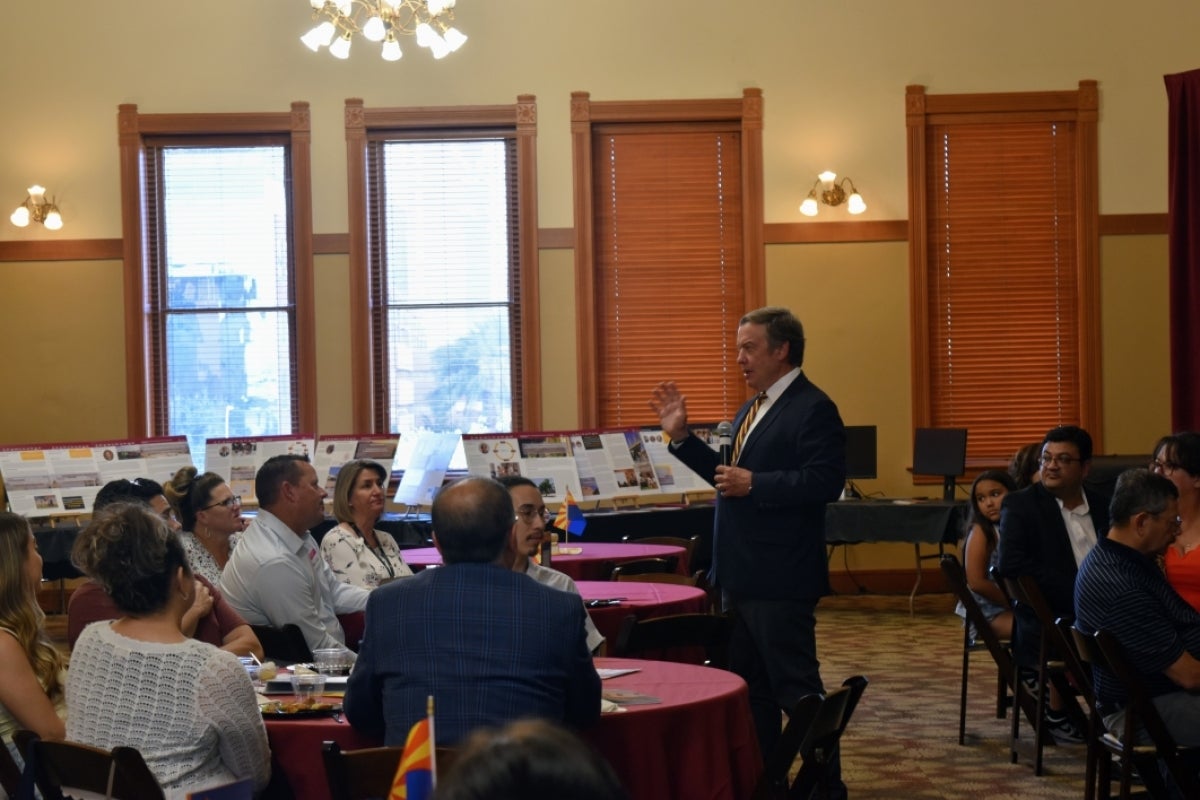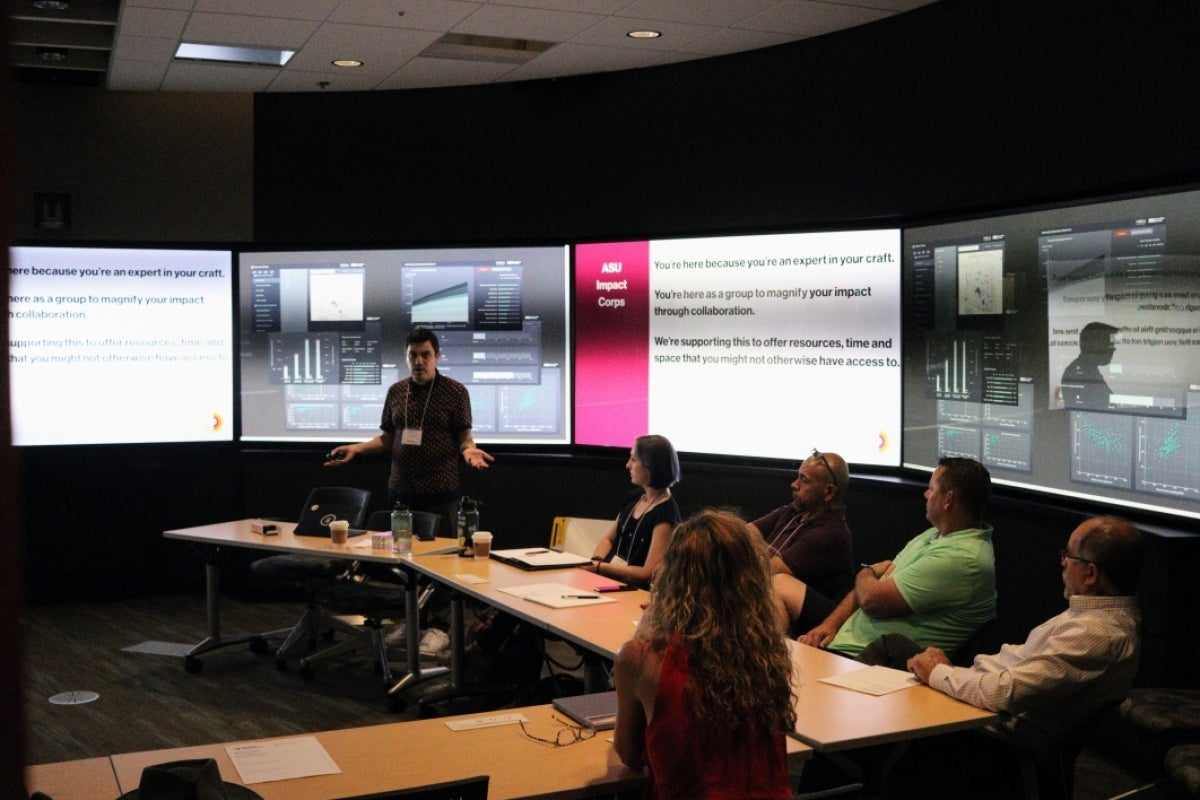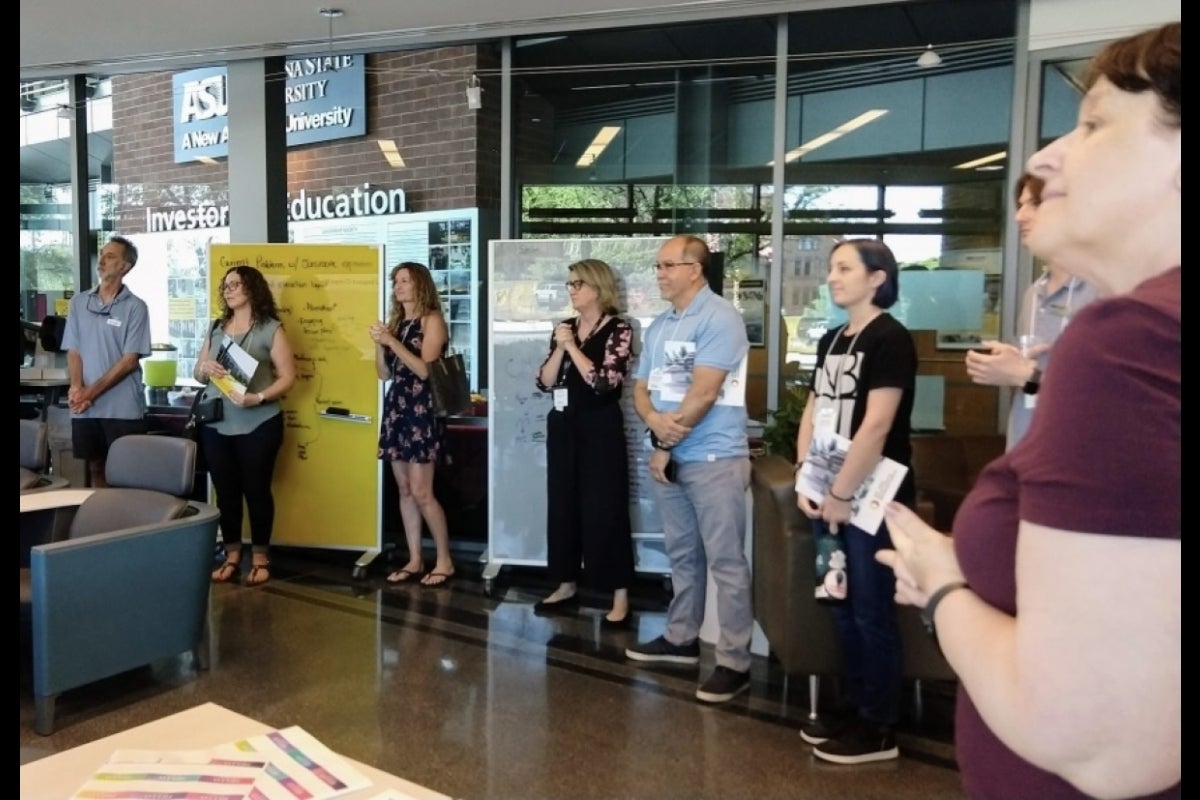High school teachers aim to replicate success statewide in ASU Impact Corps

ASU Impact Corps members met for three days at the university's Tempe campus to network and plan a statewide mentorship program. Photo courtesy ASU
Twelve Arizona teachers attended the inaugural ASU Impact Corps retreat earlier this month on Arizona State University’s Tempe campus. The program brings together high-achieving teachers from around the state to share best practices.
The three-day retreat included networking, learning about the resources ASU offers to K–12 schools, and creating a framework for a statewide teacher mentorship program.
The ASU Impact Corps is run by the ASU Helios Decision Center for Educational Excellence (DCEdEx). The cohort was selected using Postsecondary Feedback Reports (PSFR) data to identify high schools across the state whose graduates go on to do exceptionally well in specific disciplines at the state’s three public universities. The 12 teachers represent seven high schools from both large districts and rural areas across the state who had students who went on to succeed in STEM fields.
The cohort heard from representatives from ASU groups working directly with K–12 schools, including: Joe O'Reilly, Rebecca McKay and Chris Osuna from DCEdEx; Gina Conner from the Mary Lou Fulton Teachers College; Meg Grothman and Jason Denison from EdPlus’ Digi+ tool and ASU Prep Digital; and Kim Reynolds from the J. Orin Edson Entrepreneurship + Innovation Institute. Erin Hart, education policy advisor to Arizona Gov. Katie Hobbs, also spoke to the group.
Impact Corps members were recognized for their contributions to Arizona’s K–12 system and commitment to sharing promising practices and resources with educators across the state at a Recognition Ceremony at Old Main’s Carson Ballroom.
The opening remarks were given by ASU President Michael Crow, who congratulated the members and emphasized ASU’s support of all Arizona students.
“At ASU, we’re trying to break down the barriers between the university and K–12. We’ve been building tools, systems and devices to make things happen. You all are warriors in the sense that you’ve figured out how to produce very successful outcomes. We’re trying to find ways to make that success ubiquitous," Crow said.
During the summit, members explored several tools built by DCEdEx that allowed them to view data related to the community, as well as environmental and social factors affecting the educational trajectories of students in their own communities.
As the teachers dug into academic data on how high school graduates fare in the state’s public universities, they highlighted strengths and identified areas to target for improvement. Using this data, along with their own experiences, the members will lead mentor events throughout the state over the 2023–24 academic year.
“You need something that will keep you intellectually challenged, keep you professionally stimulated,” said Impact Corps member Grazyna Zreda of Tanque Verde High School. “I want to keep going so I keep learning and incorporating new ideas. If I keep growing, then I am modeling that for my students.”
Teachers in the first cohort of the ASU Impact Corps:
- Julie Baldwin, Boulder Creek High School, Anthem.
- Donald Baxley, Boulder Creek High School, Anthem.
- Chris Cook, Thatcher High School, Thatcher.
- Britny Delp, Bioscience High School, Phoenix.
- Vincent Dober, Nogales High School, Nogales.
- Anne Hoodin, Mesquite High School, Gilbert.
- Milton Johnson, Bioscience High School, Phoenix.
- Andrew Jordan, Boulder Creek High School, Anthem.
- Jigar Mehta, Nogales High School, Nogales.
- Fernando Ramirez, San Luis High School, San Luis.
- Jennifer Valenzuela, Nogales High School, Nogales.
- Grazyna Zreda, Tanque Verde High School, Tucson.
More Arts, humanities and education

Professor's acoustic research repurposed into relaxing listening sessions for all
Garth Paine, an expert in acoustic ecology, has spent years traveling the world to collect specialized audio recordings.He’s been…

Filmmaker Spike Lee’s storytelling skills captivate audience at ASU event
Legendary filmmaker Spike Lee was this year’s distinguished speaker for the Delivering Democracy 2025 dialogue — a free…

Grammy-winning producer Timbaland to headline ASU music industry conference
The Arizona State University Popular Music program’s Music Industry Career Conference is set to provide students with exposure to…




